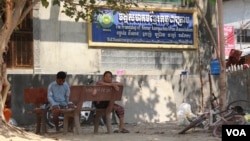Prior to a recent government sweep of the Samakki Raingsey pagoda, in Phnom Penh, monks there and authorities had a long history of simmering conflict.
The pagoda houses monks from the restive minority community of Khmer Kampuchea Krom, an ethnic group that lives in today’s Vietnam’s Mekong Delta, who claim abuse at the hands of Vietnamese authorities.
The pagoda also provides shelter for many protesters, from those who suffer land grabs to those pushing for higher factory wages.
Monks from the pagoda protested heavily in 2007 over the arrest and defrocking of monk Tim Sakhorn, who had been an advocate for Kampuchea Krom rights. Police violently suppressed those demonstrations.
Last month, a group of Phnom Penh city officials and the Ministry of Cults and Religion, backed by some 150 police and military police, “inspected” the pagoda, in a move criticized by many rights workers.
Am Sam Ath, monitoring supervisor for the rights group Licahdo, said the inspection was conducted with a heavy force, likely to “threaten and intimidate the Kampuchea Krom monks.”
“The pagoda is a place where people can stay,” he said. “They did the administrative inspection to scare the people and the monks.”
Long Dimanche, a spokesman for City Hall, denied the inspection was meant to intimidate. “It is not involved with politics,” he said. “It is regarding peace and order.”
The pagoda does not cooperate with authorities, he said. “When people go to stay there, they never tell us. There has been some crime happening. There was a killing between a monk and a monk.”
But many see last month’s inspection as political. Ou Virak, head of the think tank Future Forum, says sometimes the monks act violently in their demonstrations, in politically motivated acts. But much of the country’s religion is now politicized, he said. “The pagoda has been a tool for people in power in the past,” he said.
“It’s bad that religion is the place for politics,” he said. “I do not support biased acts.” Still, he said, an inspection of the pagoda should have been carried out by police, not municipal officials.
Thach Ha Sam Ang, acting head of the pagoda, said the monks there are not aligned against the government or with the opposition, but he said they protest—and will continue to do so—“for justice.”





